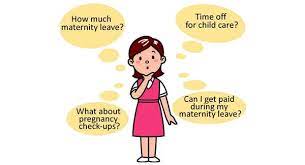INTRODUCTION TO MATERNITY BENEFIT ACT 2017
The objective Behind the Amendment to MATERNITY BENEFIT ACT 2017 is that Women often feel left out or face biases during pregnancy or after childbirth in their workplace, it is important for them to know the benefits they can avail of and the rights under the law.
The Content am going to share with you all is something very important for our corporate universe whether it’s small or large, loss-making or profit-making, Shop or an establishment irrespective of the capital, turnover, etc. all of them are in its ambit having 10 or more employees.
Table of Contents
Did you know? Indian law prioritizes the well-being of female employees during pregnancy and after childbirth. It mandates most establishments with 10 or more employees to offer essential maternity benefits. This is governed by the Maternity Benefit Act, 1961 (amended in 2017) for shops and establishments, and the Employees’ State Insurance Act, 1948 for factories with 10 or more workers.
To put it simply, if a workplace has 10 or more employees, these laws ensure that women employees receive the necessary support and benefits during this crucial phase of their lives. Let’s continue to champion workplace inclusivity and support for all working women!
In order to protect the rights of female employees during pregnancy and after childbirth, Indian law makes it mandatory for most establishments to offer maternity benefits to women employees. Maternity benefit in India is mainly governed by the Maternity Benefit Act, 1961 as amended in 2017 that applies to all shops and establishments with 10 or more employees. Those women who work in factories with 10 or more workers are given maternity benefits as available under the Employees’ State Insurance Act, of 1948.
The applicability of the law is apparently stated in the aforementioned paragraphs perhaps for removal of doubt we again recall Every Shop or Establishment, Factory, Mine, Plantation or any establishment belonging to the Government having 10 or more employees, we will understand mainly the benefits available to all the working women.

NUMBER OF PAID LEAVES AVAILABLE MATERNITY BENEFIT ACT 2017
The Maternity Benefit Act originally provided maternity benefits of 12 weeks, out of which up to six weeks could be claimed before delivery. In 2017, the law was amended to extend the period to 26 weeks. Out of the 26 weeks, up to eight weeks can be claimed before delivery. However, you need not structure your leaves in this manner—you can instead take the entire 26 weeks of leave after the delivery. Also, these are maximum periods of claim and you can claim the benefit for a smaller period as well.
In Present Scenario 26 weeks of paid leave are available to working women which can be elaborated by the following assumption.
Merry a Pregnant woman with having expected date of delivery on 01/10/2023 as per her medical reports, she has 2 options as per her health or doctor’s advice.
| Option :1 | She may take leaves from 01/10/2023 till the completion of 26 weeks.(i.e. entire leaves can be taken after due date of delivery) |
| Option :2 | She may take leaves from 01/08/2023 till the completion of 26 weeks.(i.e. 8 weeks before the date of delivery and remaining paid leaves after due date of delivery) |
Note: Dates will be tentative as per your health and condition. It’s all based on your medical advice.
If the woman has more than two surviving children, the maternity benefit is for 12 weeks only. The law was also amended to extend maternity benefits to commissioning and adoptive mothers who are now entitled to 12 weeks of leave from the date the mother receives the child.
Women undergoing a tubectomy operation (a medical procedure to stop future pregnancies) also get a paid leave of two weeks following the operation. In case of miscarriage or medical termination of pregnancy, the law permits women six weeks’ leave after the procedure. In case of an illness after delivery, miscarriage, medical termination of pregnancy or tubectomy, a woman can claim a leave with wages for a further period of one month, over and above what is allowed.
INTIMATION REGARDING THE EXPECTED DATE OF DELIVERY TO YOUR EMPLOYER IN THE MATERNITY BENEFIT ACT 2017
The Expecting working woman should intimate her intentions for paid maternity leaves between 4th and 6th month of pregnancy (it could be before the 4th month as per the circumstances allow)
If you’re expecting and planning for maternity leave, it’s ideal to inform your employer between the 4th and 6th month of pregnancy (though earlier if circumstances permit). This gives both you and your workplace ample time to prepare.

Here’s why it’s important:
1️⃣ Smooth Transition: Early notice helps your team plan for your absence and ensures a smooth handover of responsibilities.
2️⃣ Legal Requirements: Many places have laws in place to protect your right to maternity leave, but timely communication ensures everyone is on the same page.
3️⃣ Peace of Mind: Knowing your leave is arranged can reduce stress and allow you to focus on your pregnancy and upcoming bundle of joy.
Remember, communication is key! Discuss your plans openly with your employer and HR department, and be aware of any company-specific policies.
Wishing all the expecting moms a healthy and joyful journey into motherhood!
ELIGIBILITY OF A WORKING WOMAN TO TAKE MATERNITY BENEFITS FROM HER EMPLOYER.
Are you aware of your rights when it comes to maternity benefits and job security? Let’s break it down in simple terms!
1️⃣ Eligibility for Maternity Benefits: To qualify for maternity benefits, a woman needs to have worked as an employee in a company for at least 80 days in the past 12 months before her expected delivery date. This means you should have some work history with your employer to be eligible.
2️⃣ Payment During Maternity Leave: When you take maternity leave, your pay during this time is based on the average daily wage you earned before going on leave. It’s designed to ensure you have some financial support while taking care of your newborn.
3️⃣ Job Protection: Here’s the crucial part – your employer cannot fire you for taking maternity leave. They also can’t send you a termination notice that expires before your maternity leave ends. This is to protect your job while you take the time you need to bond with your baby.
Knowing your rights is essential! Share this post with your friends and colleagues to help
As per the Act, to be eligible for maternity benefits, a woman must have been working as an employee in an establishment for a period of at least 80 days within the past 12 months before the expected date of delivery. Payment during the leave period is based on the average daily wage for the period of actual absence.

An employer cannot dismiss a woman for taking maternity leave and cannot serve a termination notice to a woman on maternity leave which expires before the maternity leave ends.
BENEFITS IN ADDITION TO PAID MATERNITY LEAVES POST DELIVERY OF A CHILD
Work from Home & Crèche for Child.
1. The Maternity Benefit Amendment Act has also introduced an enabling provision relating to “work from home” for women, which may be exercised after the expiry of the 26 weeks’ leave period. Depending upon the nature of work, women employees may be able to avail of this benefit on terms that are mutually agreed with the employer.
2. The law was further amended in 2017 to make it mandatory for establishments with more than 50 workers to establish crèches. Mothers are entitled to visit the crèches up to four times a day and to two nursing breaks per day in addition to any other breaks that are available as a matter of course, until the child attains the age of 15 months.
RIGHTS AVAILABLE TO WOMAN EMPLOYEE MATERNITY BENEFIT ACT 2017
An employer cannot dismiss a woman for taking maternity leave and cannot serve a termination notice to a woman on maternity leave which expires before the maternity leave ends. Also, an employer can’t change the terms of service to the woman’s disadvantage during her maternity leave.
Further, maternity benefits and medical bonuses will have to be paid to a woman who is discharged or dismissed during pregnancy unless it is for gross misconduct.
DUTIES OF EMPLOYER TOWARDS MATERNITY BENEFIT aCT
Remember that employers are required to inform women in writing and electronically about the maternity benefits available under the Maternity Benefit Act upon their joining the workforce.
LEAVE FOR ILLNESS ARISING OUT OF PREGNANCY, DELIVERY, PREMATURE BIRTH OF CHILD, OR MISCARRIAGE:
A woman suffering from illness arising out of pregnancy, delivery, premature birth of child or miscarriage shall, on production of such proof as may be prescribed, be entitled, in addition to the period of absence allowed to her under section 6, or, as the case may be, under section 9, to leave with wages at the rate of maternity benefit for a maximum period of one month.
DOWNSIDES OF THE MATERNITY BENEFIT ACT 2017
1. Adverse impact on the job opportunities for women as the increased maternity period has also increased the employment expenses which have to be borne by the employers. Therefore, they will be reluctant to hire women employees.
2. As per the Act, the expenses on maternity leave is to be borne by the employers which are a huge expense for them. It has been stated by the International Labour Organisation (ILO) Maternity Protection Convention that employers should not be solely liable for the cost of providing maternity benefits to their women employees and it has recommended that the benefits should be provided through compulsory social insurance or public funds.


twins 14 kent hrbek red cool base stitched youth mlb jersey nike sb premium jordan 1 flight los angeles dodgers bucket hat 90s pink mercurial cleats noir jordan 11 hats yelp
skwpartners http://www.skwpartners.com/
official nfl bears jersey nike kobe v protro big stage noir chicago bears chicago flag hat for cheap north face stretch down jacket sunday best attire female nike air diamond turf black and red
renaytoronto http://www.renaytoronto.com/
nike air max 90 white size 3 nike zoom kobe 8 system basketbtout chaussures hommes san francisco giants world series cap and gown michael kors wallet women red jordan superfly 2 noir rose nike classic cortez nylon og
salankhan http://www.salankhan.com/